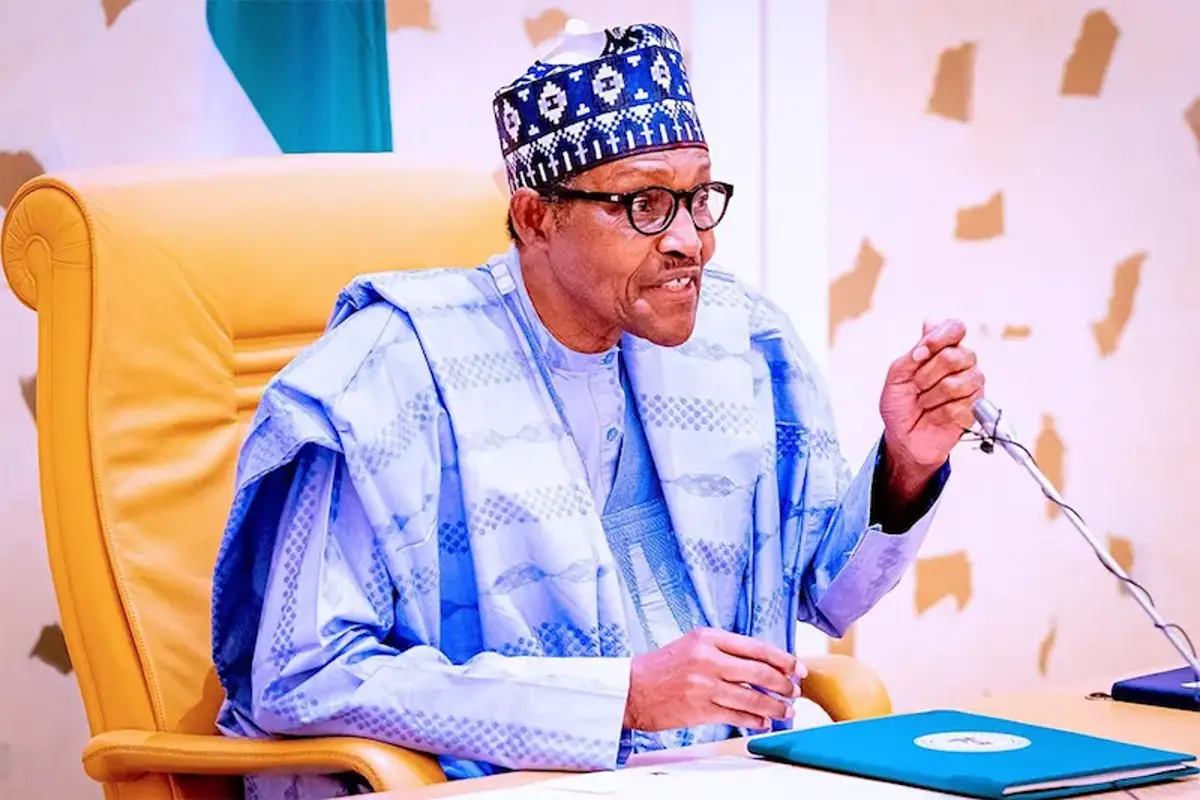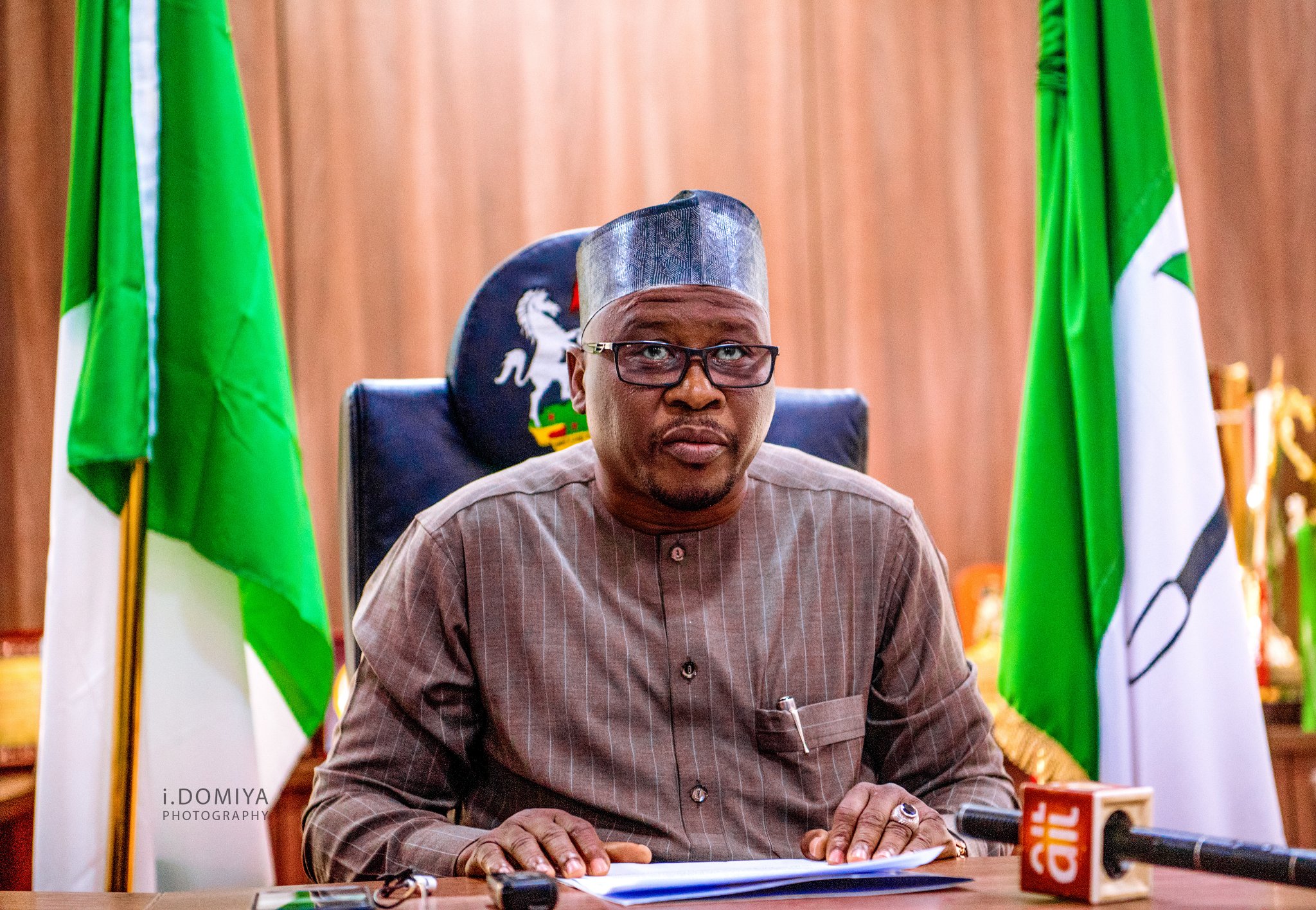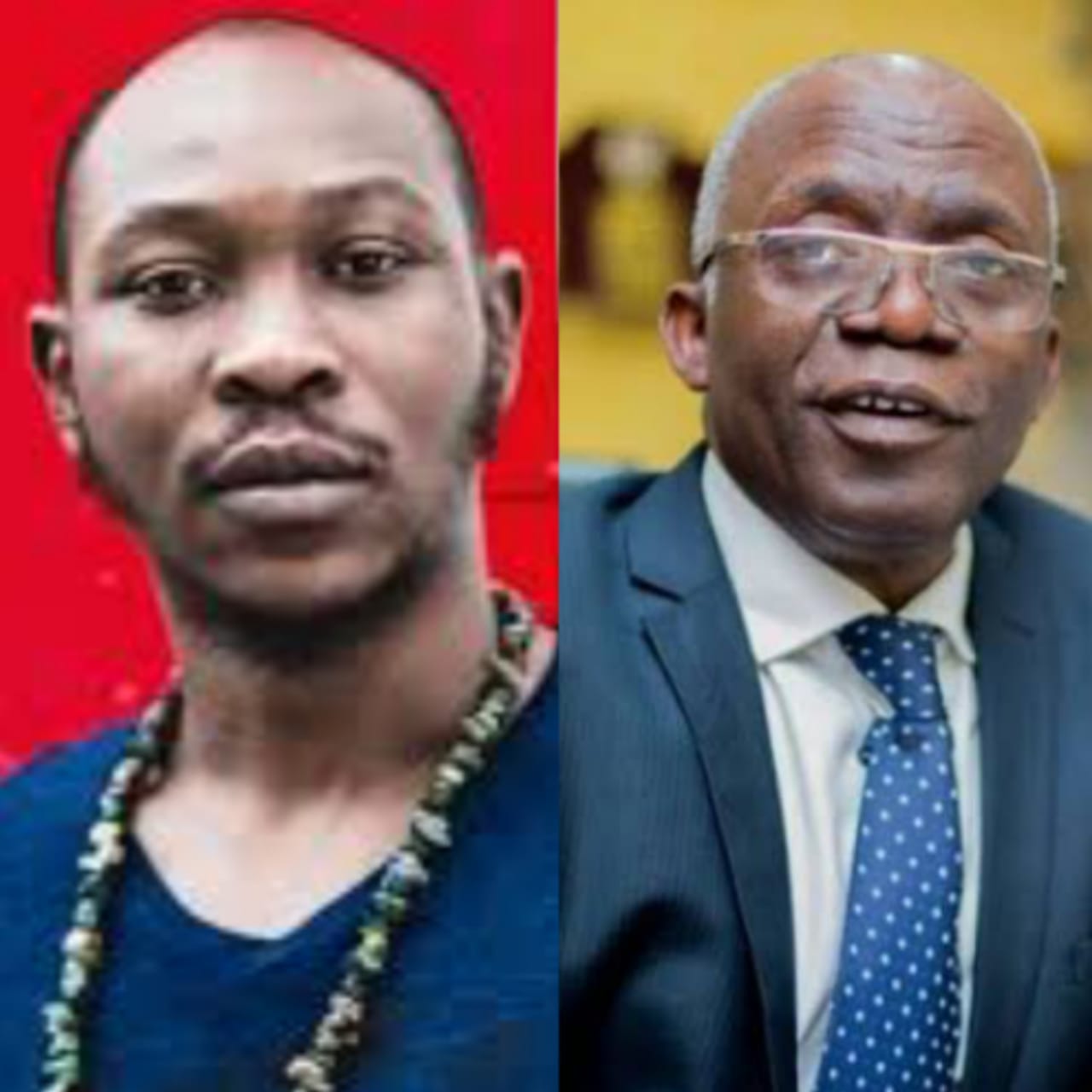Agriculture
Nigeria’s agricultural revolution created over 13m jobs in 7 years – Buhari

President Muhammadu Buhari said Nigeria’s agricultural revolution had led to the creation of over 13 million direct and indirect jobs in the last seven and half years.
Malam Garba Shehu, the president’s spokesman, in a statement on Saturday, said Buhari disclosed this in Washington DC, USA, at an interactive session entitled, “A conversation with President Muhammadu Buhari of Nigeria’’.
The event was co-hosted by the United States Institute of Peace (USIP), the International Republican Institute, the National Endowment for Democracy, and the International Foundation for Electoral Systems.
The Nigerian leader used the occasion to once again advise western nations not to be in a rush to eliminate the usage of fossil fuels in a bid to ensure a healthy climate.
According to him, Nigeria’s economy has registered positive growth in the last two quarters in spite of the gloomy outlook in the global economy, and the war in Ukraine.
Buhari also cautioned western nations on the frivolous issuance of travel advisories on Nigeria, urging the international media to be more objective in its reportage of the country.
He told the international community that in spite of the non- chalant actions and attitudes of some friends and allies, ”Nigeria is nonetheless winning the war on terrorism.”
Buhari added that the country had made significant progress in dealing with the threats to Nigeria’s and the sub-regions safety and survival.
The Nigerian leader also called on the United States to do more to improve the quality of governance in the West African Sub-region.
According to him, the survival of democracy is being challenged in the aftermath of the democratic set-backs witnessed in Mali, Guinea and Burkina Faso.
The president further narrated steps taken by his administration to expand Nigeria’s economy since coming into power in 2015.
He said focused interventions in the agriculture driven by the Central Bank of Nigeria transitioned the country from being a net importer of rice, Nigeria’s staple food, to becoming self-sufficient in its production.
‘‘This same scheme had financed the establishment and operations of over 50 integrated rice mills.
‘‘It had also financed over 4.5 million smallholder farmers, ensured the cultivation of almost 6 million hectares of farmland and almost 700 large-scale agricultural projects had been funded.
‘‘This agricultural revolution had led to the creation of over 13m direct and indirect jobs,’’ he said.
Buhari also told the Washington D.C community of global thought leaders and Democracy Advocacy Groups that the focus on the agricultural sector placed Nigeria in a better position.
He said was therefore able to handle the systemic shock caused by both COVID-19 and the Russia-Ukraine war on global food supply chains and attendant price spikes.
Buhari added that the revolution in the sector had improved the country’s capacity in the agro-allied sector, making it more efficient in enhancing and maximising production yields and reducing post-harvest losses.
‘‘The non-oil sector remains the future of our economy and I hope successive governments will consolidate on the gains we have recorded under my leadership.
‘‘You will agree with me that the Russia-Ukraine war had compelled many economies to carry out reforms and re-adjust policies to cope with the challenges posed by the conflict.
‘‘In this regard, we are paying more attention now to energy transmission and distribution through targeted collaboration with global companies like Siemens to improve our efficiency in the Power Value Chain,’’ he said.
On the rush to eliminate the usage of fossil fuels by some developed nations, the president recounted that as a member of the global community, Nigeria had participated in several rounds of talks regarding climate change and various decisions emerging from COP26 and the just concluded COP27.
‘‘But, as I stated in my Washington Post article, there can’t be double standards, wherein Western nations use their influence and weight to turn the taps off global financing for fossil fuel transactions which are much needed by developing nations, yet when they feel the pinch, they are quick to turn on their coal-powered plants.
‘‘We owe it to our people to create jobs and livelihoods and we can’t accomplish this without maximising our comparative advantage in energy to build up our manufacturing and industrial base.
‘‘Therefore, stronger commitment needs to be made to the fund for climate adaptation and mitigation, if indeed there is intent to establish equity and fairness,’’ he said.
On the positive growth recorded in the economy, Buhari said that the government’s spending on infrastructure had also been a critical aspect of the overall strategy in ensuring the economy rebounds.
He said: ‘‘Our infrastructure deficit is widely known and with the volatility in capital markets, we devised creative ways of funding this infrastructure gap to build roads and thus improving connectivity between markets and facilitating trade.
‘‘We devised investment tax credit schemes and the use of Sukuk bonds, to reconstruct, develop and rehabilitate over 20,000kms of roads.
”Additionally, we have revitalised our once comatose rail and roads such that trains are now up and running along critical corridors in different parts of the country.
‘‘Our efforts on corruption continue to pay-off as the relevant agencies continue to make impressive recoveries as well as secure Court convictions of those sabotaging Nigeria’s efforts for sustained development and growth. ”
He maintained that the major cash recoveries would be deployed in a transparent way towards funding these infrastructure gaps.
Contrary to what was obtainable when he assumed power in 2015, the president said no Local Government Area in Nigeria was now under the control of Boko Haram terrorists.
The president, however, acknowledged that Nigeria and the West African sub-region had been negatively impacted by the events in Libya, Central Africa Republic, Sahel region and the war in Ukraine.
Buhari said: ‘‘Our region is awash with small and light weapons that continue to seamlessly circulate as well as cope with the influx of foreign fighters.”
According to the president, Nigeria and other regional bodies in Africa and the rest of the world are working assiduously to deal with these existential threats to the very existence of humanity.
Buhari commended the Nigerian Armed Forces and the Multi-national Joint Task Force, consisting of Chad, Niger, Cameroon, Benin Republic and Nigeria, for demonstrating great bravery in the fight against terrorism, while paying the ultimate price in securing collective freedom.
He added: ‘‘In spite of the difficult times we face, we continue to spend very scarce and lean resources to ensure that we have a well-resourced military force to take on this task.
‘‘Ideally, these are resources that could be spent on education or healthcare or other social services, but without peace, we have learnt the hard way that our children cannot go to school or seek good healthcare.
‘‘We are nonetheless winning the war and making significant progress in dealing with the threats to Nigeria’s and the sub-regions’ safety and survival.
‘‘This steady progress is in spite of the negative reportage in international media as well as the nonchalant actions and attitudes of some of our friends and allies to sufficiently appreciate our efforts in the fight against terrorism.
“Rather than focus on negativity, which is what Travel Advisories have become, Nigeria, the sub-regions of Africa and the rest of the world can work more concertedly together to combat terrorism and prevent violent extremism.”
Buhari said that these were challenges to global peace and stability and not just Nigeria and Africa alone.
‘‘Notwithstanding these attitudinal deficits from some friends and allies, Nigeria remains open to working with the International Community and other development partners, to enhance global security and stability,’’ he added.
The president believed that ”a secured and stable Nigeria is indispensable for the overall peace and prosperity of not only the country but Africa, with huge implications for global peace and stability,”
He, therefore, underscored the need for a strategic partnership with the USA to fight common challenges, such as terrorism, climate change and entrenching democracy in Africa, together.
The president disclosed that Nigeria was on the verge of inaugurating her New Counter Terrorism Centre that would serve as a hub for counter-terrorism coordination and research in West Africa.
‘‘Our efforts are driven by our Terrorism Prevention Act 2022, the National Counter Terrorism Strategy as well as the Policy Framework and National Action Plan on Preventing and Countering Violent Extremism (PCVE),’’ he said.
Agriculture
Fintiri Unleashes N2bn Boost for Farmers as Adamawa Rolls Out 2025 Agricultural Support Programme

The Adamawa State Government has launched the 2025 Agricultural Support Programme aimed at empowering smallholder farmers and enhancing food security across the state.
Commissioner for Agriculture, Prof. David Jatau, disclosed this on Friday while briefing journalists in Yola. He revealed that Governor Ahmadu Umaru Fintiri had approved a substantial N2 billion for the initiative, which targets increased agricultural productivity in the upcoming farming season.
According to Jatau, the programme—which is already underway—will provide subsidised agricultural inputs such as fertilisers, improved seeds, and other essential materials to farmers in six local government areas.
“The programme has already commenced in six LGAs—Madagali, Michika, Hong, Maiha, Demsa, and Ganye,” he said. “By next year, during the rainy season, we will extend the programme to the remaining LGAs.”
He explained that 300 hectares of farmland would be cultivated in each of the participating local governments, with 300 farmers benefitting per council.
To ensure fairness and transparency, Jatau said a multi-stakeholder committee had been constituted to oversee the beneficiary selection process. The committee comprises representatives of traditional councils, local government authorities, security agencies, youth groups, and women organisations.
“We are also equipping extension workers with training to offer farmers guidance on modern agricultural techniques for improved yield,” he added.
The commissioner noted that the intervention would not only increase food production but also generate employment, improve rural incomes, and contribute to economic stability in farming communities.
Jatau also revealed that the state government is collaborating with non-governmental organisations and agricultural development bodies, with over 2,700 hectares of farmland pledged by development partners for cultivation.
He reaffirmed the Fintiri administration’s commitment to achieving food self-sufficiency and urged beneficiaries to make the most of the programme.
Agriculture
KWASU Microfinance Bank disburses loan to farmers

The Kwara State University (KWASU) Microfinance Bank has provided loan facilities to farmer groups in and around Malete, Moro Local Government Area.
The Vice-Chancellor and Chairman of the Board of Trustees, KWASU Microfinance Bank, Prof. Jimoh Shaykh-Luqman, announced this while presenting offer letters to the farmers’ associations at a formal event held on the university campus.
Addressing the farmers, the Vice-Chancellor, represented by the Deputy Vice-Chancellor (Administration), Prof. Moshood Jimba, said the agricultural loan scheme aimed to support farmers in boosting food production and enhancing food sustainability.
“The loan is meant to support your farm operations, especially in the upcoming planting season,” he said.
Prof. Shaykh-Luqman reaffirmed KWASU’s commitment to its mantra of being a “University for Community Development,” leveraging its expertise and resources to initiate programmes that drive local development.
The Managing Director and Chief Executive Officer of KWASU Microfinance Bank, Alhaji Hakeem Hassan, noted that the agricultural loan scheme was piloted last year with 15 farmers as beneficiaries.
He added that the pilot scheme yielded positive results for both the farmers and the bank, as all beneficiaries successfully repaid their loans.
Following this success, he said, the scheme had been expanded to include more farmers under various farmers’ associations.
The News Agency of Nigeria (NAN) reports that the associations benefiting from the agricultural loan scheme include Alanu Agbelere Farmers Group, Agbedola Ketere Group, and Itesiwaju Agbe Group Omoni.
Others are Agbeloba Farmers Association (Malete Market), Agbeyewa Elemere Farmers Group, Agbe Olofeere Group, and Agbeloga Malete Farmers Group.
Speaking on behalf of the farmers, the Chairman of Agbeloba Farmers Association (Malete Market), Alhaji Mohammed Abdulrazaq, expressed gratitude to the university and the bank for their trust.
He pledged, on behalf of the beneficiaries, to utilise the loans effectively and ensure prompt repayment.
Agriculture
Kano Govt. implements N2.3bn livestock empowerment programme

The Kano State Government has begun implementing the second phase of its livestock empowerment programme valued at N2.3bn under the Kano State Agro-Pastoral Development Project (KSADP).
The Commissioner for Agriculture and Natural Resources, Dr Mamood Danjuma, disclosed this while addressing newsmen on Thursday in Kano.
Danjuma said the initiative aims to support beneficiaries with livestock, feeds, drugs, and salt lick to enhance their economic well-being.
According to him, 911 beneficiaries are being supported with two rams each, feed for three months, drugs and salt lick, while 2,386 women are being supported with two goats and a buck goat in the poorest households in the state.
He explained that the total package under the empowerment programme showed that 1,342 bulls were procured by the government at the cost of N560m, 1,822 rams were procured at the cost of N175m and 7,158 goats bought at the cost of N451m.
“Under the cattle scheme, each cattle gains 100kg over a period of 120 days. The fattening period is for 120 days, making three cycles possible in a year.
“As for the small ruminants fattening scheme, with the same 120-day fattening period yielding an extra 15kg/animal.
“The project promotes goats’ reproduction through women who will take care of the animals and sell the young ones to improve their income and standard of living,” he said.
He said that the programme promotes economic empowerment, particularly among women, by providing them with livestock to care for and sell, ultimately improving their income and standard of living.
-

 Headlines4 years ago
Headlines4 years agoFacebook, Instagram Temporarily Allow Posts on Ukraine War Calling for Violence Against Invading Russians or Putin’s Death
-

 Headlines4 years ago
Headlines4 years agoNigeria, Other West African Countries Facing Worst Food Crisis in 10 Years, Aid Groups Say
-

 Foreign4 years ago
Foreign4 years agoNew York Consulate installs machines for 10-year passport
-

 News1 year ago
News1 year agoZero Trust Architecture in a Remote World: Securing the New Normal
-

 Entertainment3 years ago
Entertainment3 years agoPhyna emerges winner of Big Brother Naija Season 7
-

 Headlines2 years ago
Headlines2 years agoNigeria Customs modernisation project to check extortion of traders
-

 Entertainment2 years ago
Entertainment2 years agoMovie download platform, Netnaija, announces closure
-

 Economy2 years ago
Economy2 years agoWe generated N30.2 bn revenue in three months – Kano NCS Comptroller













